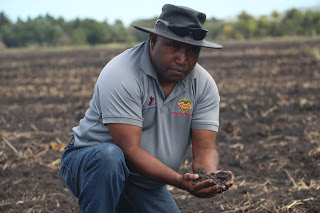Trukai rice expert applauds Agri Minister’s stance
Trukai Industries Rice Development Manager Humphrey Saese has praised the sentiments of Minister for Agriculture and Livestock Hon Benny Allan, MP, who recently urged the need to place greater emphasis on celebrating World Food Day in PNG.
World Food Day was founded by The Food and Agriculture Organisation of the United Nations (FOA) and is celebrated every year on October 16th.
Hon Mr. Allan’s recently expressed disappointment that the day is not celebrated enough in PNG.
“I wholeheartedly support Hon. Mr. Allan’s call for public support for World Food Day from all stakeholders. Trukai will certainly support any new initiatives instigated by Mr. Allan to give this great day its proper respect and recognition,” Mr Saese said.
Mr. Allan in his public notice also expressed the need for greater investment in the rural sector focused around agriculture, to prevent excessive urban migration. The practice places great strain on urban relatives and wantoks to provide support while adding to the social problems of squatter settlements, where rural migrants often end up.
“This predicament of course arises from a lack of opportunity in rural areas for many, and this is where the importance of agricultural development is so obvious. In fact, the importance of agricultural development is paramount to all Papua New Guineans regardless of where they live,” Mr Saese said.
“Around 25 per cent of our landmass in PNG is suitable for agriculture with yam, taro, banana and sweet potato being the main staple crops grown.
“At Trukai our own investment in the initial assessment of the land suitability country wide uncovered that about of 14 percent of the total land mass of PNG is suitable for growing rice, taking into account the necessary infrastructure required as well as considerations inherent of an archipelagic geography and high variability in climatic conditions.
“A large proportion of PNG’s main export crops are grown by smallholders including cocoa, oil palm and coffee. Our goal is to create a viable rice industry that also gives the benefit of market access to hundreds of smallholder farmers across PNG.”
Mr. Saese said Trukai’s new irrigation facility at Erap was commissioned last week and will be used to produce the rice seeds required for distribution to smallholder farmers along with its commercial projects.
“10 hectares(Ha) should produce approximately 70 ton of seed per year, which equates to over 900Ha of commercial production. The facility gives us the ability to continue testing and improving the yield of varieties that are available,” he added.
World Food Day was founded by The Food and Agriculture Organisation of the United Nations (FOA) and is celebrated every year on October 16th.
Hon Mr. Allan’s recently expressed disappointment that the day is not celebrated enough in PNG.
“I wholeheartedly support Hon. Mr. Allan’s call for public support for World Food Day from all stakeholders. Trukai will certainly support any new initiatives instigated by Mr. Allan to give this great day its proper respect and recognition,” Mr Saese said.
Mr. Allan in his public notice also expressed the need for greater investment in the rural sector focused around agriculture, to prevent excessive urban migration. The practice places great strain on urban relatives and wantoks to provide support while adding to the social problems of squatter settlements, where rural migrants often end up.
“This predicament of course arises from a lack of opportunity in rural areas for many, and this is where the importance of agricultural development is so obvious. In fact, the importance of agricultural development is paramount to all Papua New Guineans regardless of where they live,” Mr Saese said.
“Around 25 per cent of our landmass in PNG is suitable for agriculture with yam, taro, banana and sweet potato being the main staple crops grown.
“At Trukai our own investment in the initial assessment of the land suitability country wide uncovered that about of 14 percent of the total land mass of PNG is suitable for growing rice, taking into account the necessary infrastructure required as well as considerations inherent of an archipelagic geography and high variability in climatic conditions.
“A large proportion of PNG’s main export crops are grown by smallholders including cocoa, oil palm and coffee. Our goal is to create a viable rice industry that also gives the benefit of market access to hundreds of smallholder farmers across PNG.”
Mr. Saese said Trukai’s new irrigation facility at Erap was commissioned last week and will be used to produce the rice seeds required for distribution to smallholder farmers along with its commercial projects.
“10 hectares(Ha) should produce approximately 70 ton of seed per year, which equates to over 900Ha of commercial production. The facility gives us the ability to continue testing and improving the yield of varieties that are available,” he added.



Post a Comment